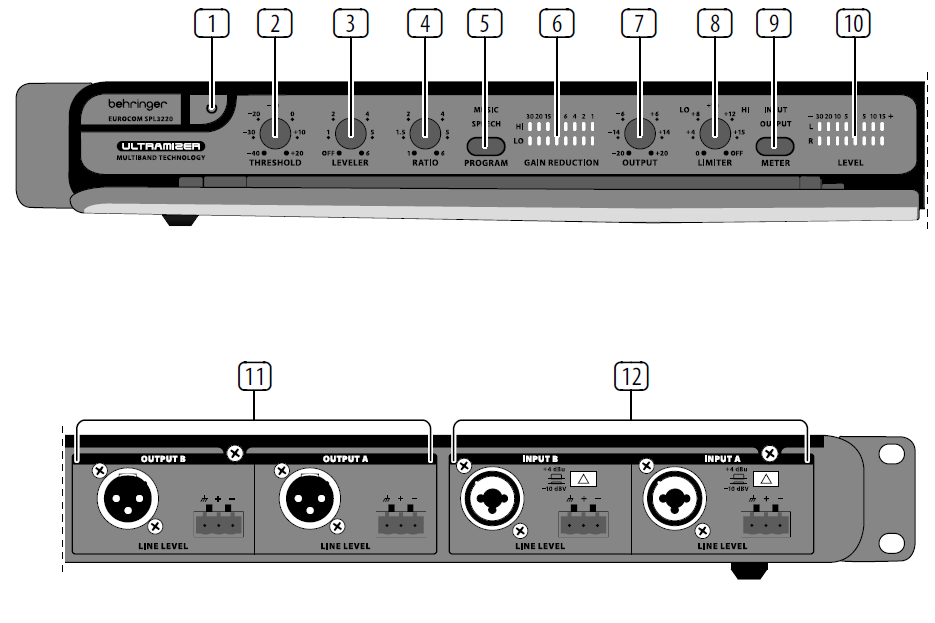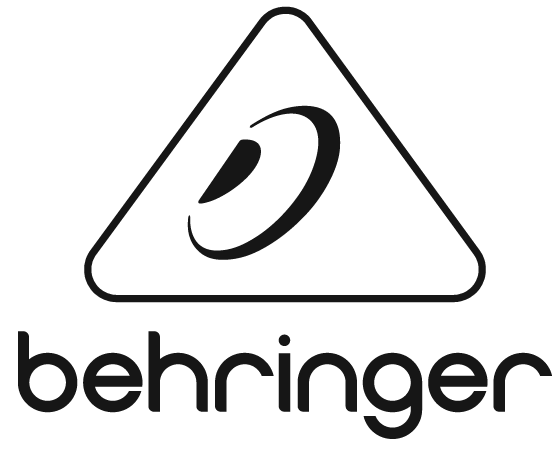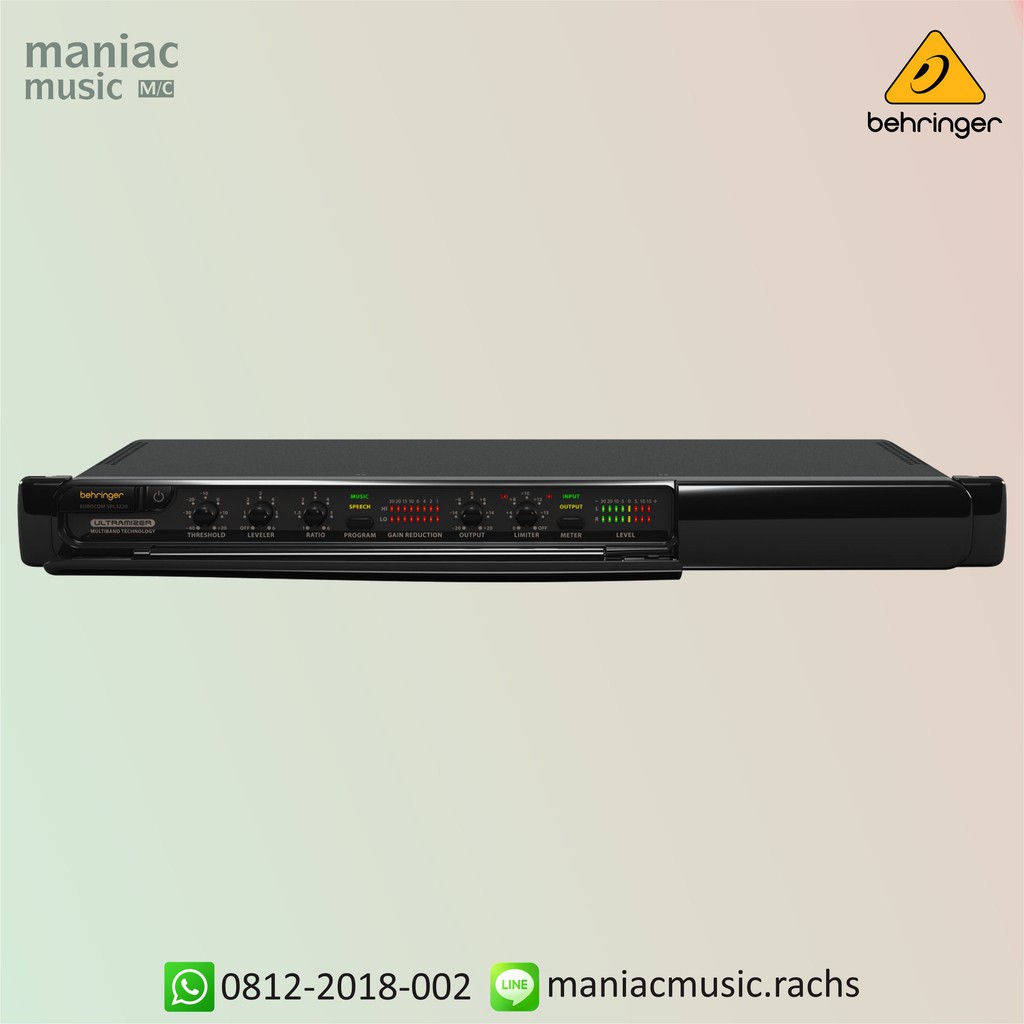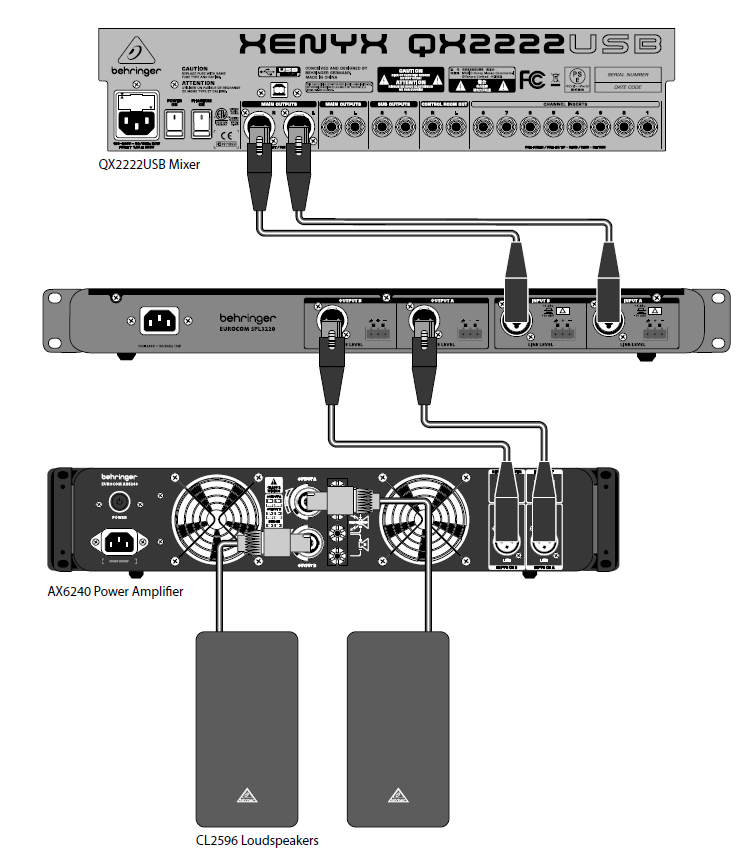Behringer Multiband Dynamics Processor

Warning:
- Terminals marked with this symbol carry electrical current of sufficient magnitude to constitute risk of electric shock. Use only high-quality professional speaker cables with ¼” TS or twist-locking plugs pre-installed.All other installation or modification should be performed only by qualified personnel.
- This symbol, wherever it appears, alerts you to the presence of uninsulated dangerous voltage inside the enclosure
- voltage that may be sufficient to constitute a risk of shock.
- This symbol, wherever it appears, alerts you to important operating and maintenance instructions in the accompanying literature. Please read the manual.
- Caution:To reduce the risk of electric shock, do not remove the top cover (or the rear section). No user serviceable parts inside. Refer servicing to qualified personnel.
- Caution:To reduce the risk of fire or electric shock, do not expose this appliance to rain and moisture. The apparatus shall not be exposed to dripping or splashing liquids and no objects filled with liquids, such as vases, shall be placed on the apparatus.
- Caution:These service instructions are for use by qualified service personnel only. To reduce the risk of electric shock do not perform any servicing other than that contained in the operation instructions. Repairs have to be performed byqualified service personnel.
- Read these instructions.
- Keep these instructions.
- Heed all warnings.
- Follow all instructions.
- Do not use this apparatus near water.
- Clean only with dry cloth.
- Do not block any ventilation openings. Install in accordance with the manufacturer’s instructions.
- Do not install near any heat sources such as radiators, heat registers, stoves, or other apparatus (including amplifi ers) that produce heat.
- Do not defeat the safety purpose of the polarized or grounding-type plug. A polarized plug has two blades with one wider than the other.A grounding-type plug has two blades and a third grounding prong. The wide blade or the third prong are provided for your safety. If the provided plug does not fi t into your outlet, consult an electrician for replacement of the obsolete outlet.
- Protect the power cord from being walked on or pinched particularly at plugs, convenience receptacles, and the point where they exit from the apparatus.
- Use only attachments/accessories specified by the manufacturer.
- Use only with the cart, stand, tripod, bracket, or table specified by the manufacturer, or sold with the apparatus. When a cart is used, use caution when moving the cart/apparatus combination to avoid injury from tip-over.
- Unplug this apparatus during lightning storms or when unused for long periods of time.
- Refer all servicing to qualified service personnel. Servicing is required when the apparatus has been damaged in any way, such as power supply cord or plug is damaged, liquid has been spilled or objects have fallen into the apparatus, the apparatus has been exposed to rain or moisture, does not operate normally, or has been dropped.
- The apparatus shall be connected to a MAINS socket outlet with a protective earthing connection.
- Where the MAINS plug or an appliance coupler is used as the disconnect device, the disconnect device shall remain readily operable.
- Correct disposal of this product: This symbol indicates that this product must not be disposed of with household waste, according to the WEEE Directive (2012/19/EU) and your national law. This product should be taken to a collection center licensed for the recycling of waste electrical and electronic equipment (EEE).The mishandling of this type of waste could have a possible negative impact on the environment and human health due to potentially hazardous substances that are generally associated with EEE. At the same time, your cooperation in the correct disposal of this product will contribute to the efficient use of natural resources. For more information about where you can take your waste equipment for recycling, please contact your local city office, or your household waste collection service.
- Do not install in a confined space, such as a book case or similar unit.
- Do not place naked flame sources, such as lighted candles, on the apparatus.
- Please keep the environmental aspects of battery disposal in mind. Batteries must be disposed-of at a battery collection point.
- Use this apparatus in tropical and/or moderate climates.
LEGAL DISCLAIMERMUSIC Group accepts no liability for any loss which may be suffered by any person who relies either wholly or in part upon any description, photograph, or statement contained herein. Technical specifi cations, appearances and other information are subject to change without notice.
All trademarks are the property of their respective owners. MIDAS, KLARK TEKNIK, LAB GRUPPEN, LAKE, TANNOY, TURBOSOUND, TC ELECTRONIC, TC HELICON, BEHRINGER, BUGERA and DDA are trademarks or registered trademarks of MUSIC Group IP Ltd. © MUSIC Group IP Ltd. 2017 All rights reserved..
LIMITED WARRANTYFor the applicable warranty terms and conditions and additional information regarding MUSIC Group’s Limited Warranty, please see complete details online at music-group.com/warranty
MULTIBAND DYNAMICS PROCESSOR SPL3220 Hook -up
Step 1: Hook-Up
Step 2: Controls

- POWER switch turns the unit on and off .
- THRESHOLD knob determines the level at which the signal will be reduced in dynamics.
- LEVELER knob compensates for varying levels in the program material in order to achieve a consistent compression.
- RATIO knob determines the ratio between the input and output levels for all signals exceeding the threshold point.The control range can be adjusted from 1:1 to 6:1.
- PROGRAM button optimizes the crossover frequency of the two bands for either music (500 Hz) or speech (2 kHz).
- GAIN REDUCTION meter indicates the current gain reduction for each band.
- OUTPUT knob allows the output signal to be increased or decreased to compensate for level loss due to the compression or limiting.
- LIMITER knob sets the point by which the output signal is not allowed to go beyond.The HI and LO LEDs will light to indicate activity by either limiter.
- METER button determines whether the LEVEL meter displays the input or output level.
- LEVEL meter displays either the input or output level, depending on the position of the METER button.
- OUTPUT A and B send the processed signal via XLR or Euroblock connectors.
- INPUT A and B accept signals to be processed via XLR, ¼ “, or Euroblock connectors.
Step 3: Getting started

- Make all audio and power connections to the unit before turning the power on.
- Set the controls as shown in the graphic (THRESHOLD fully counterclockwise, LEVELER at 3, RATIO at 3, OUTPUT at 0 and LIMITER off ).
- Press the power button to turn the unit on.
- Begin playing audio to send a signal to the SPL3220.
- Press the PROGRAM knob to select Music or Speech to best suit your application.
- Turn the THRESHOLD knob counterclockwise until the GAIN REDUCTION meter occasionally reaches 6.
- Turn the LIMITER knob counterclockwise to allow some extra headroom and avoid loud peaks in the music or speech.
- Press the METER button so that the OUTPUT LED is lit.
- Adjust the OUTPUT knob so that the LEVEL meter occasionally reaches 0, but does not cause the red LEDs to light.
Specifications
Audio Input
| Type | RF-filtered, servo-balanced input |
| Impedance | 42 kΩ balanced, 21 kΩ unbalanced |
| Nominal operating level | -10 dBV / +4 dBu, switchable |
| Max. input level | +22 dBu, balanced and unbalanced |
| CMR @ 1 kHz | 50 dB typical |
Audio Output
| Type | Servo-balanced output stage |
| Impedance | 100 Ω, balanced, 50 Ω unbalanced |
| Max. output level | +22 dBu balanced and unbalanced |
| Bandwidth | 10 Hz to 100 kHz, +0 / -3 dB |
| THD @ +4 dBu | 0.03% typical |
| Noise & hum, unity gain | > 83 dBu (20 Hz to 20 kHz, unweighted) |
| Crosstalk @ 20 kHz | -70 dB typical |
| CMR @ 1 kHz | 50 dB typical |
Crossover Section
| Type | 24 dB Butterworth filter |
| Corner frequencies | Switchable (Music 500 Hz / Speech 2 kHz) |
Compressor/Leveler Section
| Type | Multiband IKA compressor |
| Threshold control | -40 to +20 dB |
| Leveler control | OFF to 6 |
| Ratio control | 1:1 to 6:1 |
| Output control | -20 to +20 dB |
Indicators
| Gain reduction meters | 1/2/4/6/10/15/20/30 dB |
| In/Out level meters | -30/-20/-10/-5/0/+5/+10/+15 dB |
| LED indicator for each function switch |
Power Supply
| Mains voltage | 100 – 240 V~ 50/60 Hz |
| Power consumption | 10 W |
| Fuse | T1.25 A H 250 V~ |
| Mains connection | Standard IEC receptacle |
Physical
| Dimensions (W x D x H) | 445 x 192 x 50 mm (17.5 x 7.6 x 2.0″) |
| Weight | 1.8 kg (4.0 lbs) |
Important information
- Register online:Please register your new MUSIC Group equipment right after you purchase it by visiting behringer. com. Registering your purchase using our simple online form helps us to process your repair claims more quickly and efficiently. Also, read the terms and conditions of our warranty, if applicable.
- Malfunction:Should your MUSIC Group Authorized Reseller not be located in your vicinity, you may contact the MUSIC Group Authorized Fulfiller for your country listed under “Support” at Behringer. com. Should your country not be listed, please check if your problem can be dealt with by our “Online Support” which may also be found under “Support” at Behringer.com. Alternatively, please submit an online warranty claim at Behringer. com BEFORE returningthe product.
- Power Connections:Before plugging the unit into a power socket, please make sure you are using the correct mains voltage for your particular model. Faulty fuses must be replaced with fuses of the same type and rating without exception
FCC
MULTIBAND DYNAMICS PROCESSOR SPL3220complies with the FCC rules as mentioned in the following paragraph:This equipment has been tested and found to comply with the limits for a Class B digital device, pursuant to part 15 of the FCC Rules. These limits are designed to provide reasonable protection against harmful interference in a residential installation. This equipment generates, uses and can radiate radio frequency energy and, if not installed and used in accordance with the instructions, may cause harmful interference to radio communications. However, there is no guarantee that interference will not occur in a particular installation. If this equipment does cause harmful interference to radio or television reception, which can be determined by turning the equipment off and on, the user is encouraged to try to correct the interference by one or more of the following measures:
- Reorient or relocate the receiving antenna.
- Increase the separation between the equipment and receiver.
- Connect the equipment into an outlet on a circuit different from that to which the receiver is connected.
- Consult the dealer or an experienced radio/TV technician for help.
This device complies with Part 15 of the FCC rules. Operation is subject to the following two conditions:
- This device may not cause harmful interference, and
- This device must accept any interference received, including interference that may cause undesired operation.
Important information:Changes or modifications to the equipment not expressly approved by MUSIC Group can void the user’s authority to use the equipment.

[xyz-ips snippet=”download-snippet”]


